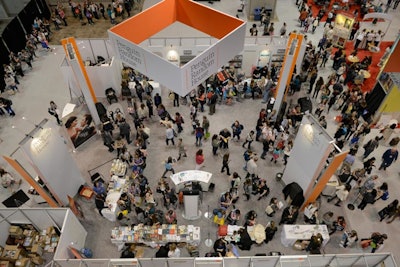
One of the growing trends in the trade show sector is the addition of fan-focused expos or consumer days, which open a window to the public to events that have normally remained exclusive to members of the trade. A prime example of this trend is BookCon, the consumer event that launched in 2014 as an extension of Reed Exhibitions' book industry event BookExpo.
BookCon's upcoming fourth edition—which will take place June 3 to 4 at the Jacob K. Javits Convention Center in New York directly after BookExpo—is slated to be its biggest ever. Some 25,000 consumers are expected to attend the event, which will have a variety of opportunities for fans to interact with authors and panels featuring high-profile authors and talent such as Kevin Hart, Krysten Ritter, Dan Brown, Margaret Atwood, and Veronica Roth.
Brien McDonald, the event director of BookCon and BookExpo, spoke with BizBash about what planners should keep in mind when launching a consumer-focused event, the initial thinking behind BookCon, changes that have been made in the last four years, and more.
1. Consider the opportunity in your market.
McDonald says that the initial thinking behind BookCon's inception in 2014 was that popularity was soaring around young adult and book-to-film and book-to-TV adaptations. "We had all this amazing content. There was so much fantastic stuff to dig in on," says McDonald. "We're adept at working fan events for our ReedPop events at New York Comic Con and C2E2, so we thought we had an amazing sector right at our fingertips."
2. Trade shows and consumer extensions have two different audiences.
"BookExpo is a focused professional event. The attendee base is only members of the trade. We have a distinct focus on booksellers, librarians, and retailers," says McDonald. "For BookCon, it's straight up for the fans. The trade show wraps up Friday evening and then we bring in a whole new set of attendees and they're purely fans."
Considering that, McDonald notes that the trade show itself morphs as well. "What publishers and exhibitors are speaking about at BookExpo are future titles, deals, conversations around the business in the retail sector, marketing, and publicity," he says. "With BookCon, you bring in authors who are either releasing a book very soon, promoting a book that's out, or promoting a high-profile book you want to make consumers aware of. The conversations and the pieces being promoted are different."
3. Make the fan experience more efficient.
Since its debut, McDonald says that tweaks have been made to make face-to-face interaction between fans and authors a simpler experience. "What we're trying to do is give people more time to do the things they want to do. We've integrated technology, including digital wristbands, and we'll have pre-ordering of books. We want to keep fans out of line and keep them in places they want to be."
4. Find ways to elevate main stage events.
McDonald also notes that BookCon ramped up its main stage programming and has added more high-profile panels than ever before. "When we did our post-show research, we found the need to have really interesting author mash-ups and conversations on our stages was rated really highly," he says. "We knew we had an opportunity there to give fans what they wanted. We're working with exhibitors very closely to create more interactive exhibits and activations, and change the tide of what some of our exhibitors are used to doing at trade shows."
5. Hosting consumer-focused events is vital for brand relevancy.
"With books, anything the reader would want is at their fingertips. It's their decision how to get it and who to get it from. Consumers are in the driver's seat," says McDonald. "As a brand, you can elevate yourself above the noise if you're giving your readers and fans the opportunity to interact directly with your talent, your authors, and your books."
In the case of BookCon, McDonald explains that fans are looking for brand identities. "They want to hook in with a brand they feel represents themselves," he says. "When you think about reading, it's a very personal act that defines a lot about how people think about themselves and project themselves. In our case, it's critical to make one-on-one interactions happen."
6. Don't be afraid to shake up the model.
For planners considering hosting their first fan event, McDonald says to not be scared to shake up the traditional trade show model. "Trade shows are an old model. The pathway can be set in stone if you allow it to be that way," he says. "You have to do your market research, get customer buy-in, and be ready to be bold and shake things up. It'll not be without its challenges. But if it's executed properly, it'll breathe new life into the show."
7. Understand your target audience.
"Thinking back to our early brainstorming meetings around BookCon, the initial thought was that 'everyone reads.' But you need to really be smart and hone in on a particular sector of your audience," says McDonald. "The adage around here is when you program for everybody, you program for nobody. So don't be concerned about fulfilling every piece of the market. Just find out where the most passion is and go for that."



















